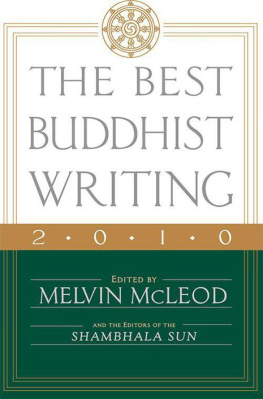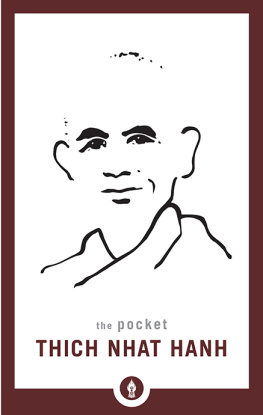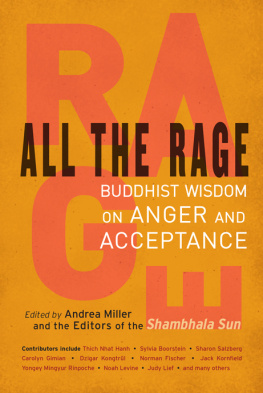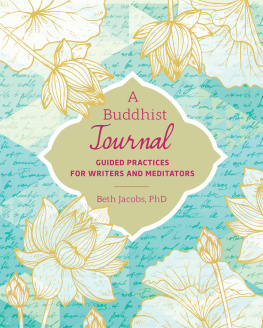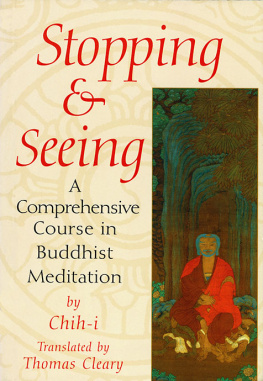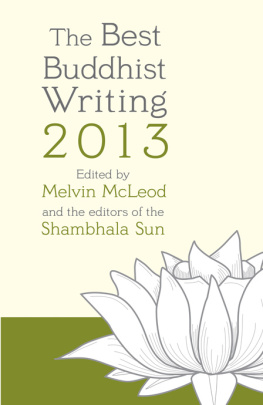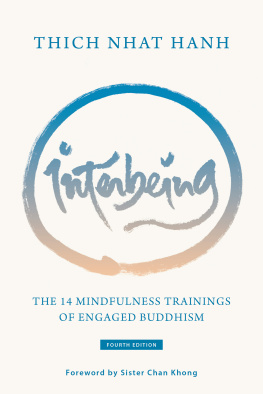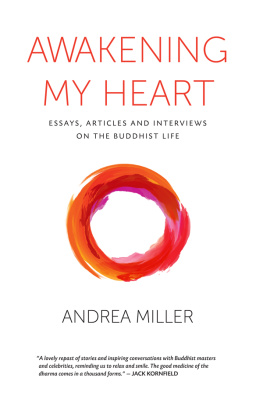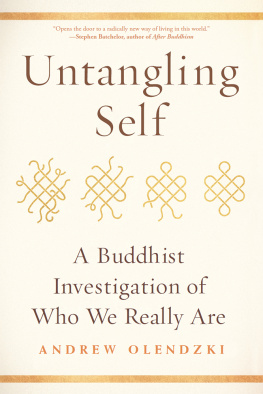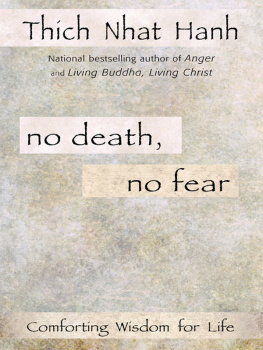THE BEST
BUDDHIST
WRITING




Edited by Melvin McLeod
and the Editors of the Shambhala Sun

S HAMBHALA
Boston & London 2011
Shambhala Publications, Inc.
Horticultural Hall
300 Massachusetts Avenue
Boston, Massachusetts 02115
www.shambhala.com
2010 by Melvin McLeod and the editors of the Shambhala Sun
All rights reserved. No part of this book may be reproduced in any form or by any means, electronic or mechanical, including photocopying, recording, or by any information storage and retrieval system, without permission in writing from the publisher.
eISBN 978-0-8348-2175-0
ISBN 978-1-59030-826-4
ISSN 1932-393x
2006213739
Contents
Stan Goldberg
Joan Sutherland
Jarvis Jay Masters
Thich Nhat Hanh
Thich Nhat Hanh
Daniel Asa Rose
Jaimal Yogis
Sylvia Boorstein
Diane Ackerman
Gaylon Ferguson
Dzongsar Jamyang Khyentse Rinpoche
Sakyong Mipham Rinpoche
John Tarrant
Steve Silberman
Laura Fraser
Yongey Mingyur Rinpoche
Carolyn Rose Gimian
Mary Pipher
Pema Chdrn
Norman Fischer
Anam Thubten
Dzigar Kongtrl Rinpoche
Hannah Tennant-Moore
Elizabeth Brownrigg
Daniel Doen Silberberg
John Daido Loori, Roshi
Venerable Bhikkhu Bodhi
David Loy
Jan Chozen Bays
Andrew Olendzki
Shozan Jack Haubner
It has never seemed more important to assess the role of religion in the worldin our own lives, in our society, in global affairs. Its certainly surprising that we find ourselves in this situation at the beginning of the twenty-first century. Who could have predicted that at the end of the Cold War the world would divide again on the ancient fault lines of religious identity? That American political and cultural life would fall into unprecedented animosity fueled by religious passions? That the struggle between reason and superstition would be seen as one of the most important philosophical debates of our time?
Religion is blamed, and justly Im afraid, for much of the conflict and oppression in the world today. Yet religion is also an integral part of human existence. We need morewe are morethan the merely material. We need something that takes us beyond this life and the world immediately in front of usor at least places them in a larger, spiritual context. We have a deep inner certainty that there is more than just the world of the physical senses, that there are questions, answers, and experiences beyond the powers of science, observation, and reason. We turn to religious practice for meaning, for morality, for deep peace and harmony. For all the problems of organized religion, we are spiritual beings. We know implicitly that there is more than just this body, just this world, just this lifetime, and we need to touch it.
So as the old joke goes, we cant live with religion and we cant live without it. Where does Buddhism stand in this dilemma? Sam Harris, the author of The End of Faith and one of the so-called new atheists, suggests that Buddhism can meet our innate spiritual needs while obviating some of the problems of the major theistic religions. Naturally, there is much that Buddhism shares with other religions, but there are important ways in which it is different. Lets look at some of Buddhisms unique characteristics and how they are reflected in this years Best Buddhist Writing (while noting that much of what were going to say about Buddhism also applies to the contemplative or mystical traditions found within all of the major faiths).
The great divide between Buddhism and the worlds other major religions is the idea of God, a creator deity. Buddhism is a nontheistic religion: it is the religion with no God. The Buddha was a human being who practiced and achieved enlightenment, and if we follow his example and practice as he did, we can wake up too. If a religion has no God, everything changes.
In Buddhism, the starting place is a very human problem: suffering. Some people have accused Buddhism of being negative and obsessed with suffering. Buddhists call it realism. Life has its obvious sufferings, such as illness, loss, and death, and beyond that, all lives, even the most pleasant and privileged, are marked by an underlying sense of fear and unease.
Some of the most powerful and moving stories in this book are about coming to gripsbravely, openly, and realisticallywith lifes difficulties. I think Stan Goldbergs memoir of hospice work (and his own cancer diagnosis) that opens this book is a perfect example of the Buddhist approach to suffering, one of love and gentleness. In that context, a true meeting of human hearts can happen.
Elsewhere in this volume, Sylvia Boorstein tells us how we can connect with the universal truths of the human condition by sharing with each other our worries and concerns for those we love. Elizabeth Brownrigg struggles with a difficult caregiving situation, and the Zen teacher Norman Fischer suffers the death of his best friend. Daniel Asa Rose is having a tough time with his teenage son, but they are brought together by a century-old reminder of tragic loss.
If working with such suffering is the challenge, then the bad news, as weve already noted, is that Buddhism doesnt offer us an outside refuge or savior. It would be great if there were onewho wouldnt want that?but the truth, at least according to Buddhism, is that were on our own. The good news is that we can do it. We have the inherent resourcesthe intelligence, courage, wisdom, and loveto handle our problems.
Many schools of Buddhism call this our buddhanature. It is the opposite of original sin. You could call it original virtue. Our true nature is awake, open, and compassionate, and the ignorance and neuroses that obscure it are only temporary. This positive, hopeful view shines through many stories and teachings in this volume. The titles alone tell the story: Joyful Wisdom; Natural Wakefulness; and You Are Here, in which the great teacher Thich Nhat Hanh explains that everything we need is right here, right now (and indeed where else could it be?).
None of this means its going to be easy. We have only to look at the state of our world to know that our obscurations, if ultimately temporary, are still powerful and deep-seated. In Buddhism, its all about mind. Our enlightenment and happiness, as well as our ignorance and suffering, are all a product of the mind.
Buddhism traces our problems back to ignorance. We fundamentally misunderstand what we experienceboth our own nature and the nature of the worldand so we suffer. The path is working with the mind to remove the obscurations and reveal its original purity and goodness. In turn, the worlds basic goodness is also revealed. This we do through the wealth of skillful means for which Buddhism is renowned, what we generally call meditation. Meditation taps into our inborn awareness and intelligence to wake up from our deep-seated belief in the solid reality of self and other and experience life as fundamentally open, interdependent, and joyful.
The best way to learn how to meditate is directly from a qualified teacher. Short of that, there is some very good meditation instruction in this years edition of The Best Buddhist Writing . The Tibetan teacher Dzongsar Jamyang Khyentse Rinpoche offers a guided meditation instruction that focuses on the key point of Buddhist practice: doing nothing. Buddhist meditation is about stopping, not creating. Its not about changing who we arethe trying to do that is actually the root of our problemits about being who we are, simply and directly.
Next page
